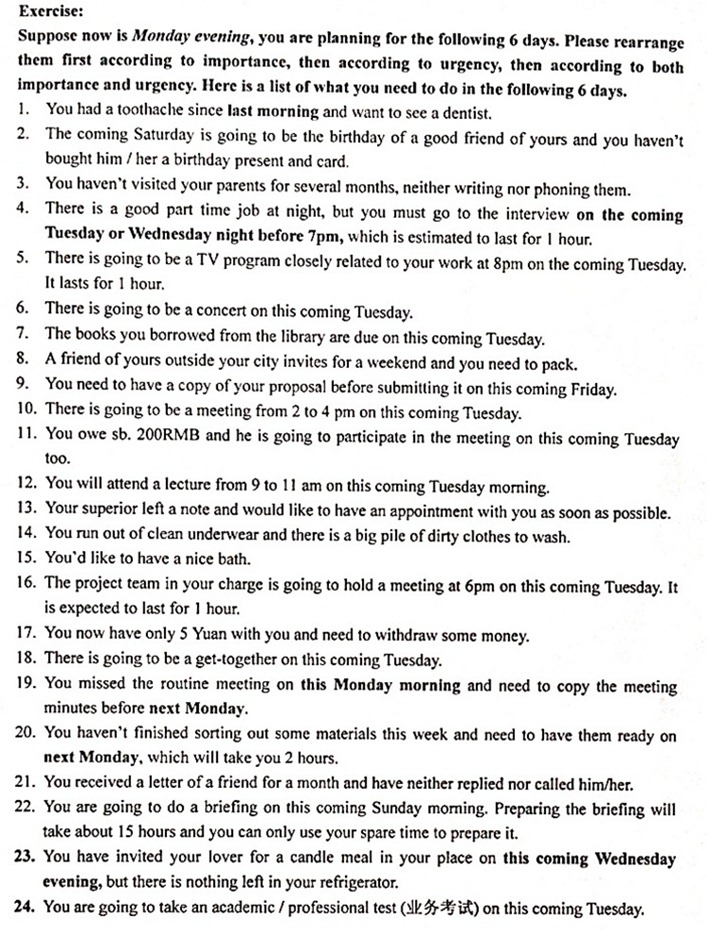I use the GTD(Get Things Done) to finish the exercise. It involves five key steps to do somethings efficiently: Collect, Process, Organize, reflection and Action. I did the exercise as following:
1. Collect
I read the 24 things one by one. For the each thing, if it was actionable, I would express the thing as “to do sth …” format. I have one list and one schedule to deal with these things. If a thing has a due date, I will put it in the schedule, or I just put it into the list. Then, all things will be collected as the following:
Action: (it should be actionable, more detail, something in this list is not urgent but perhaps very important.
1) see a dentist as soon as possible
3) phone my parents for their health and recent news
13) call my superior to make an appointment with the note that …
14) put the clothes into the wash machine, start to run
15) have a bath
17) withdraw some money, or I will not pay the taxi or meal
21) call my good friend
22) think the project “prepare a briefing”, and divide the briefing into some parts, and write it (this item is also in schedule )
Schedule: (these things are urgent)
| Tue | 5) watch TV program related to my work 6) go to a concert 7) return the books I borrowed from library 10) attend a meeting 11) return 200RMB 12) attend a lecture 16) hold project meeting 18) attend a get-together 24) take an academic test |
| Wed | 4) go to the interview 23) buy foods for a candle meal |
| Tur | |
| Fri | 8) pack for weekend’s invite of my friend 9) copy my proposal |
| Sat | 2) buy a present and card for my friend |
| Sun | 19) copy the meeting minutes 20) sort out some materials 22) do a briefing on morning |
2. Process / Organize
In GTD, the process and organize is two steps to put them into projects and be assigned a context. For simple, I put them together.
Firstly, I will examine the actions in the schedule one by one. I append start date and due date to these actions and sort it with due date. Then, the list will be the following(only with Tuesday):
| Tue | 9am – 11am | 12) attend a lecture |
| 2pm – 4pm | 10) attend a meeting 11) return 200RMB to sb. who will attend the meeting |
|
| 6pm – 7pm | 16) hold project meeting | |
| 8pm – 9pm | 5) watch TV program related to my work | |
| due to this day | 7) return the books I borrowed from library 18) attend a get-together 6) go to a concert 24) take an academic test |
There are two conflicts on Tuesday. 6) go to a concert, 24) take an academic test
I will think the importance between the test and the project meeting. If the test affacts my future career, I will reschedule the project meeting. So, “go to a concert” and “take a test” will be put the context “future/maybe”, I will do them in the furture.
"return the books” will be assgined to my suboridinate to finish.
If I don’t feel tired, I will attand a get-together, or I will cancel it.
3. reflection
In the weekend, I will review all things that I have done in this week and I will do in the next week.
4. Action(Do)
Detail plans no action is null.
There are a lot of details that I will describe them in the future.

